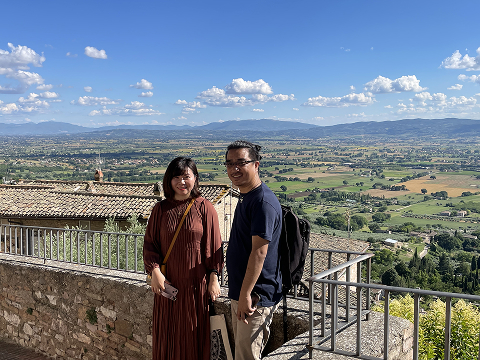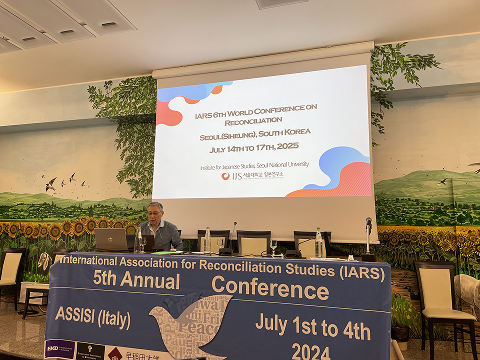The recent study trip and participation in the IARS conference provided an invaluable opportunity to engage with diverse researchers, explore new perspectives, and challenge my own limitations.

About the Report
At the IARS Conference, I presented on the theme of “Propaganda, Literature and Nostalgia during the Sino-Japanese War.” Japan and China have had a long-standing relationship, but it is complex and fraught with various issues. The mutual perceptions of Japan and China are not monolithic; they are interwoven with multiple elements, and especially regarding modern warfare, a tendency of heightened caution between the two countries is evident. In other words, the perception of war between Japan and China remains unresolved, continuing to generate discrepancies.
To clarify the causes of these discrepancies, I focused on the Sino-Japanese War (1937-1945) and analyzed Japan’s propaganda activities towards China. During the war, literature in Japan was emphasized as a means of mobilizing the populace and was used as part of state propaganda. Notably, nostalgic expressions were prominent in literary works, contributing to the reinforcement of cultural identity by the state. Using the concept of “hometown,” propaganda was deployed to strengthen a shared national identity. In my presentation, I analyzed how Japanese propaganda was conducted against China, examining Chinese-language newspapers and magazines published in occupied territories at the time, and clarified how literature was utilized as a tool of propaganda.

Insights from the Jena Seminar and IARS Conference
Up until now, my research has primarily focused on Japan-China relations, but during this seminar and conference, I learned how the concept of reconciliation is discussed in different contexts. Through direct dialogue with researchers from various nationalities and backgrounds, I became aware of differing perspectives and the diverse approaches to reconciliation. This experience allowed me to incorporate new viewpoints into my own research.
In particular, when listening to presentations on moral injury, PTSD, and trauma issues, I began to consider that collective trauma in different countries might be influencing the conflicts in historical perceptions of war in East Asia. Additionally, in a Japan-China joint public opinion survey conducted by the Genron NPO, one of the reasons cited for the negative perception of China among the Japanese public was China’s sensitive reaction to war perceptions, which often leads to heightened tensions. This seems to reflect the deep trauma that modern wars have left on China, and furthermore, China’s persistent focus on “revival” and “strength” may also stem from this trauma. However, there is often a tendency within China to deny the existence of such trauma. This denial is rooted in the belief that China waged a “righteous war” against invaders, and therefore, issues like moral injury and PTSD should not exist. This background is one of the factors making mutual understanding between Japan and China more challenging.
To truly understand these issues, it is important not to narrow our focus solely on Japan-China relations, but to step back and view the problem from a global perspective. By referring to historical perceptions and reconciliation efforts around the world, new approaches and solutions might emerge.
Reflections on Reconciliation Gained from the Study Trip
The experience of visiting Germany and Italy allowed me to reaffirm the connection between theory and practice and the importance of interpersonal exchange. The reconciliation efforts based on Germany’s historical background, as well as direct encounters with people, deepened my understanding of reconciliation.
One particularly impactful experience was the visit to the Buchenwald concentration camp. This visit prompted me to reconsider how we confront history and the memories of war. Buchenwald has a serene atmosphere, with not so many excessive photos or restored exhibits, yet there is a quiet power that resonates there. Many people once passed through its iron gates; some survived but were not allowed to speak of what happened, while others were forced to remain there forever. Today, white clover flowers bloom on the site of former suffering, and perhaps even four-leaf clovers can be found there. The wind of history that blows from the past brings tears, yet it is warm and gentle. Buchenwald stands quietly, without sensational explanations or appeals, leaving it up to each visitor to decide how to accept and reconcile with its history. This quietness has a profound power to touch people’s hearts and encourage deep reflection.
Through this training, I was once again reminded of the importance of understanding the diversity and differences in the world. By encountering different cultures and perspectives, it was able to maintain a fresh outlook and respect for academic research. Especially in the field of humanities and social sciences, it is important constantly be mindful not to narrow our perspectives. It is crucial to recognize oneself not only by introspection but also by understanding the outside world. In China, there is a saying, “Read ten thousand books and travel ten thousand miles,” and this experience reaffirmed the significance of not only reading extensively but also seeing and experiencing things firsthand. While building theories is important, there is a profound understanding that can only be gained through meeting and interacting with people.
We each have different experiences and walk different paths, yet I realized that we still share similar concerns and emotions. The concept of reconciliation is not just an issue of groups, regions, nations, or the world; it also involves reconciliation between individuals and within oneself.
I will apply the experiences and insights gained from this project to my future research. In particular, I intend to reconsider the theme of reconciliation from a broader perspective, not just within the context of Japan-China relations but from an international viewpoint.
This study trip provided an opportunity to share reports and research discussions with the participants, walk through the beautiful towns of Europe, experience history in museums and churches, enjoy delicious food, and discuss each other’s experiences and concerns. This time spent together brought great encouragement and warmth to my heart. I would like to express my sincere gratitude to all the participants and the professors. I hope that we will continue to deepen our research together with this invaluable experience.
I would also like to express my sincere gratitude to Professor Asano for giving us this precious training opportunity, and to all those who supported us. I will always cherish the memories from this trip.

